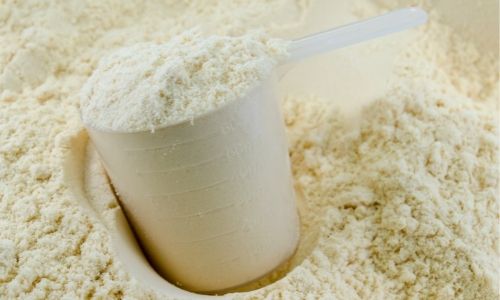Whey protein is widely used as a supplement and is known for promoting muscles mass. It enjoys wide popularity in the fitness world. But one may ask- is it good for health?
Well, this is what we intend to address for you in this article. There are plenty of health benefits that whey protein can offer that make it suitable for health. However, a few ill effects are also there that one must be cautious about to get the maximum benefit from whey. Read on to find out more!
10 Health Benefits Of Whey Protein
Whey protein is considered to be a healthy diet, and scientific research backs this claim. Let us see look at some of the benefits of consuming whey protein.
1. Whey protein helps with muscle growth.
Taking a whey protein supplement can considerably promote your muscle growth. Your muscle mass tends to decrease with age. You can address this problem by incorporating strength training into your schedule and also switching to consuming an adequate diet.
Taking high protein foods can help your body in muscle-gaining.
Whey is a high-quality protein source and can help with the prevention of age-related muscle loss. Whey protein is also considered to be somewhat better in comparison to the other kinds of protein.
Whey is also rich in leucine, which, as per the study, is one of the most excellent protein-promoting amino acids.
It is equally important to take a protein-rich diet, or else the supplements won’t make much of a difference.
2. Whey protein is an excellent source of protein.
Whey protein is a complete protein and consists of all the essential amino acids. It is one of the best sources of dietary protein present in the market and hence is in great demand. Such qualities make it a go-to protein for athletes and bodybuilders.
Whey is a rich source of BCCAS (Branched-chain amino acids), which are essential for athletes, and are easily metabolized into the cells as suggested by the study. Hence, whey protein is excellent for athletes. It aids the repair and rebuilding of lean muscle tissues.
3. Whey protein may result in a decrease in blood pressure.
The study asserts that whey beverages can help in decreasing blood pressure in men and women who have hypertension.
It is pretty known that abnormal blood pressure might lead to other health issues such as heart problems. Whey protein can thus help in case of issues of the heart, too, and improve cardiovascular health.
This study also asserts that whey protein can potentially improve blood pressure and vascular function in individuals who are obese or overweight.
4. Whey protein can help with asthma.
The study has shown a little bit of the impact of whey protein supplementation on the cytokine response in atopic asthma. Taking more potent whey-based supplementation may prove to be beneficial in cases of asthma.
5. Whey protein can improve immunity.
The bioactive components present in whey make it fit for offering protection against infections and viruses, as the report suggests. Thus, whey protein can also prove to boost your immunity and help you fight infections.
6. Whey protein may help in the treatment of type 2 diabetes.
Whey protein can also be found to be beneficial for the moderation of blood sugar. This report suggests that whey protein produces a more significant insulin response as compared to the other protein meals.
7. Whey protein may also help with reducing inflammation.
If the inflammation is chronic, it can be harmful to the body. Hence, it is necessary to take care of your inflammation. The study finds that high doses of whey protein can reduce C-reactive protein level, which is a primary marker of inflammation.
Hence, whey protein can prove to be beneficial to your body in case of inflammation. In fact, whey can also promote wound healing on account of this property.
8. Whey protein may boost your body’s natural antioxidant defenses.
Antioxidants help in reducing oxidative stress in the body and hence result in a decreased risk of many diseases. Whey protein is high in cysteine and hence enhances the body’s antioxidant defenses, as the report suggests.
For this reason, high cysteine foods, such as whey protein, may boost the body’s natural antioxidant defenses.
As per this study, whey protein activates the immune cells in the body, hence protecting it from infection. Whey protein is said to fight the bacteria that cause diarrhea and result in many deaths among children. It was also demonstrated that the infants who consumed whey protein did not suffer from diarrhea.
10. Whey protein might also improve bone health.
The report contends that whey protein can be good for bone health and promote new bone formation. The components of whey can also prove to be good for tooth health by protecting against tooth tissue demineralization.
Side effects of Whey Protein
With all these health benefits, there are a few downsides on health too that can be caused by whey protein. Hence, it is equally important to be precautious and be aware of your health condition before taking whey. It must also be remembered to not take it in excess. Let’s see what are the potential side effects of whey protein.
Whey protein consists of a small part of milk proteins and hence may trigger allergic reactions in people who are allergic to milk products. If you are allergic to dairy, consuming whey protein can make you sick. It would be best to avoid whey in case of sensitivity towards dairy products.
People who suffer from lactose intolerance may notice issues such as nausea, cramps, or bloating on the consumption of whey protein.
Other than that, excess consumption of whey protein may lead to digestion issues. The symptoms may include diarrhea, pain, cramps, nausea, etc. It may also lead to constipation in certain cases.
In case of kidney problems, it would be best to consult your nephrologist before taking whey. Whey, otherwise, is generally well tolerated by people.
All in all, whey is a protein is a healthy supplement that can benefit you in many ways. However, like they say, “precaution is always better than cure.”
FAQS
Is there any way to make raw protein taste better?
There are plenty of things you can try with your raw whey protein to make it taste better. You may add natural flavors to it or consume it with fruits. Adding honey to it or consuming it with your juice will also improve the taste.
Are there different types of whey protein?
On the basis of concentration, there are three types of whey protein. They are Whey Concentrate, Whey Isolate, and Whey Hydrolysate. Whey protein concentrate nearly consists of 80 percent of whey protein. Whey Isolate has 90 percent of protein with relatively low fat. Whey Hydrolysate is basically whey isolate or whey concentrate that is broken into amino acids for easier absorption.
Conclusion
You might not have imagined so many benefits that whey protein could offer. But the answer to your question is yes, whey protein is good for health. Other than muscle-building requirements, there are many other health benefits it can offer.
However, like most things, it has its downsides too. We would suggest keeping in mind your allergies and other issues and taking the advice of your dietician to benefit from whey protein the most. It should also be kept in mind to not over-consume whey protein.
Meanwhile, we would be thrilled to know of your journey with whey protein in the comments below if you have had one. Let us also know if you are planning on adopting whey protein in your diet, and whether you benefitted from our article.




